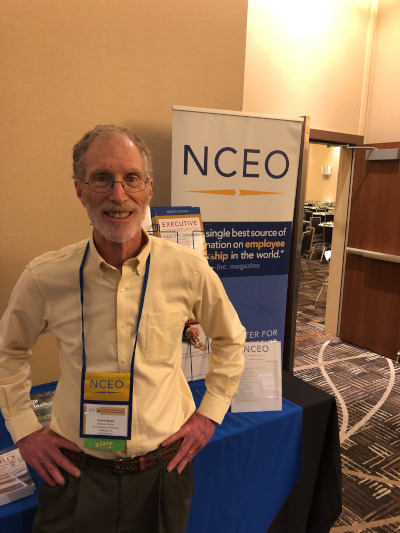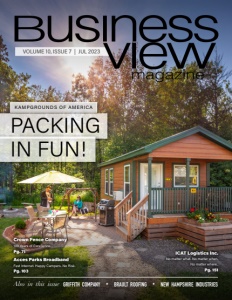National Center for Employee Ownership
helping employee-owned businesses thrive
Through education and advocacy efforts, NCEO helps to guide employee-owned businesses
The National Center for Employee Ownership has been at the forefront of empowering businesses since 1981. With a strong commitment to its mission, the organization’s primary objective is to assist people in making informed decisions, offering a range of resources from reliable technical information to inspirational content that helps companies maximize the potential of employee ownership.
As a 501(c)(3) nonprofit with 1,700 members, NCEO is a vital resource for employee-owned businesses, providing up-to-date research, and valuable information, and fostering ownership cultures through events and support.
Executive Director, Loren Rodgers, recounts, “We exist to make employee ownership thrive. We see thriving as being two things, making it bigger, meaning more people being participants in some kind of employee ownership plan. And making it better, trying to make sure that it achieves all the hopes and aspirations that people have when they put employee ownership into place, empowered workforces, more effective companies, transfer of wealth to people who wouldn’t otherwise have it, all that good stuff.”
 The NCEO’s Approach to Employee Culture and Member Support
The NCEO’s Approach to Employee Culture and Member Support
With a dedicated staff of 20, NCEO has been transformed into a fully virtual organization, a positive move according to Rodgers. He shares, “We’ve hired people all over the country. We all used to be in the San Francisco Bay area, but now we’re everywhere. Being virtual has forced us to stop relying on in-person conversations, just running into people. We’ve been a lot more systematic about setting up check-ins with each other and having metrics that we track from week to week, month to month. So being virtual has been awesome.”
Despite being a nonprofit organization, Rodgers emphasizes the commitment to running the NCEO in a manner that closely resembles an employee-owned model. “We are really participative. Everybody on staff has a lot of autonomy to pursue their own projects within the business. We get everybody on staff involved in our strategic planning, we transparently share all of our strategic planning metrics.”
In terms of how NCEO works for its members, Rodgers acknowledges, “We see ourselves more as supporting them than representing them. There are other great organizations in the field, the ESOP Association, and ESCA, and their roles are to represent the interests of employee ownership in DC and state houses. We support companies that already are employee-owned, and companies that are considering becoming employee owned.”
He highlights that while the NCEO predominantly serves members with ESOPs or those considering that model, support is extended to other forms of employee ownership. These include approaches like direct share sales to employees, the utilization of employee ownership trusts, and the establishment of worker cooperatives.
 Factors to Consider and Benefits of Employee Ownership through an ESOP
Factors to Consider and Benefits of Employee Ownership through an ESOP
For those considering an ESOP, Rodgers says there are a few factors that are part of the final decision. These include whether it makes sense financially, evaluating whether the company has a payroll of sufficient size to support the costs associated with an ESOP, and assessing the potential tax benefits for the seller, the company, and the participants.
He adds that beyond the financial aspects, there are also non-financial questions such as whether the priority is obtaining the highest possible return for their ownership in the company. While an ESOP may still be the best option in this regard, it’s worth noting that selling to an outsider could potentially provide faster access to funds.
However, he notes, “People should also ask themselves how important the legacy of their businesses is, having the name remain the same, having the same set of core values, preserving the jobs of the leadership team and everybody on staff. Some of those jobs, no matter what a buyer says, are probably going to go away if an outsider buys the business.”
As for the benefits of an ESOP, Rodgers suggests that it should be viewed as a wealth-building plan and not solely a retirement plan. “Wealth building is relevant, no matter what your age is,” he says. “The second thing is that with ESOP companies, you don’t take a hit to your current day compensation. In fact, ESOP companies tend to actually pay a bit more, as they’re more likely to outperform so that often translates into bonuses.”
He explains that ESOP companies also tend to invest more in their employees. “That’s partly because companies that become employee-owned are more likely to believe in an employee-centric way to approach management. Also, if you’re an ESOP participant, the company simply has more invested in you already. If you leave, then you’ll need to be paid out.”
Because employee-owned companies prioritize their workforce and invest in their development they are more inclined to offer additional benefits and support such as tuition reimbursement programs and well-defined career paths. This means that even if an individual’s current focus is on achieving short-term goals like purchasing a house, being part of an employee-owned company tends to offer more advantages. Additionally, the commitment to employee well-being and growth makes them a favorable choice for individuals seeking long-term benefits and opportunities.
Assisting those making decisions regarding employee ownership is a task NCEO takes seriously, considering the options on a case-by-case basis. “We see our role as helping people make decisions that they will still feel good about in 10 years,” Rodgers says. “We try to let the information speak for itself. We don’t have any financial interest in what decision a current owner makes when they are thinking about selling to the employees.”
He mentions that sometimes they may advise against an ESOP if it is not the right fit for the circumstances. The NCEO’s primary objective is to ensure that individuals and companies make informed decisions that align with their long-term goals and objectives.
“A lot of the owners that we talk to are really concerned about being confident about the welfare of the employees that helped them build the business, they’re concerned about having the values that they infused the business with being protected by not having a private equity firm or a large public company being the owner and decision maker about it,” he relays.
NCEO’s Events, Networking, and Educational Resources for Employee Ownership
In addition to offering continuous guidance, the NCEO arranges several events throughout the year, including an annual conference that attracted 1,800 attendees in 2023. They also host smaller gatherings specifically designed for companies exploring the concept of employee ownership. The organization also offers webinars and opportunities to facilitate peer networking meetings, fostering knowledge sharing and collaboration among members.
“Whenever we get our members talking to each other it’s like this spark of magic, and suddenly they’re best friends and sharing ideas about how the business ought to work,” Rodgers portrays. In terms of educational materials, NCEO offers 60 different publications covering topics such as setting up and operating an ESOP, insurance, stock valuation, and the development of an ownership culture within organizations.
“Ownership culture is a huge piece of what we do,” he says. “Those tend to be the most popular sessions at our conference. I think that is another reason that people choose to set up employee ownership and that people stay at employee-owned companies because they want to be part of the culture.”
Employee Ownership Trends and Future Initiatives
Rodgers reports that employee ownership continues to grow, with the most recent data indicating that the growth has primarily occurred within existing employee-owned companies, rather than an increase in the number of companies transitioning to a new model.
“The curve for the count of ESOP companies is pretty flat, but the count for the number of ESOP participants is definitely up,” he suggests, adding that he expects to see a shift in the next set of data.
“It hasn’t shown up in the numbers yet, but I think for the last two years, we’ve seen companies feel like they got through COVID, and maybe there’s an owner who held on for another couple of years, just to make sure the business survived. Now they decide it is time to sell to the employees. I think once the next couple rounds of numbers show up, we’re going to see a nice big increase in that trend line, for both ESOPs and the other forms of employee ownership.”
In terms of future initiatives, Rodgers outlines three areas of focus for NCEO. Firstly, a continued commitment to robust in-house research, revealing significant findings such as employee owners having 92% greater net household wealth compared to non-employee owners.
Positive developments in legislation at the state and federal levels are also on the radar, along with the growing network of organizations and resources dedicated to promoting employee ownership such as the recent partnership with the Employee Ownership Expansion Network.
“We’ve got this great combination where they’re on the ground, right there where business owners are when they’re thinking about who ought to own their businesses after them. They’ve got all of our resources, our research, all those publications. We think that’s going to be an explosive combination, and really up the game for getting the word out about employee ownership,” he concludes.
AT A GLANCE
National Center for Employee Ownership
What: A nonprofit organization with a membership of 1,700 that promotes and supports employee ownership.
Where: 20 employees virtually across the United States
Website: www.nceo.org

